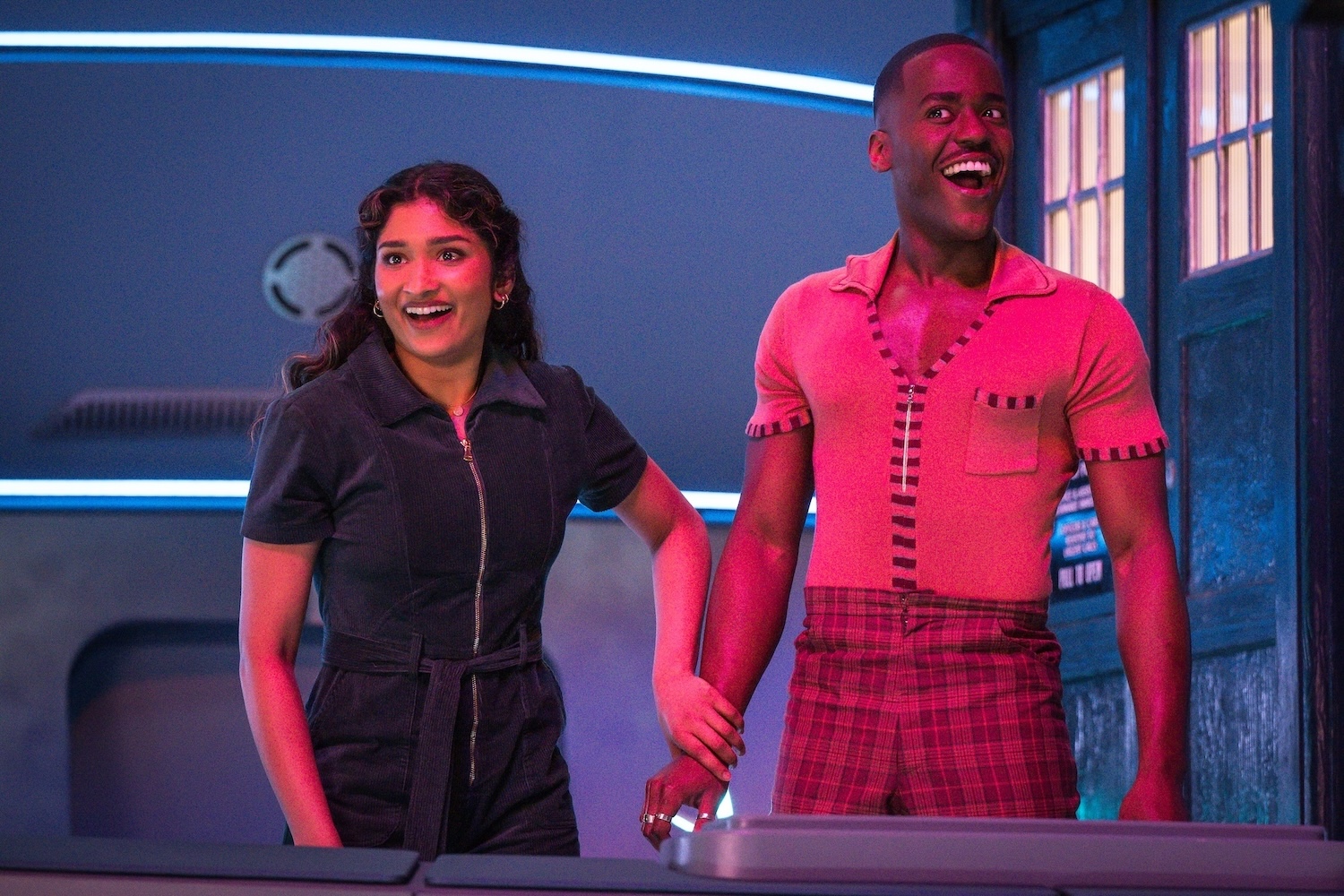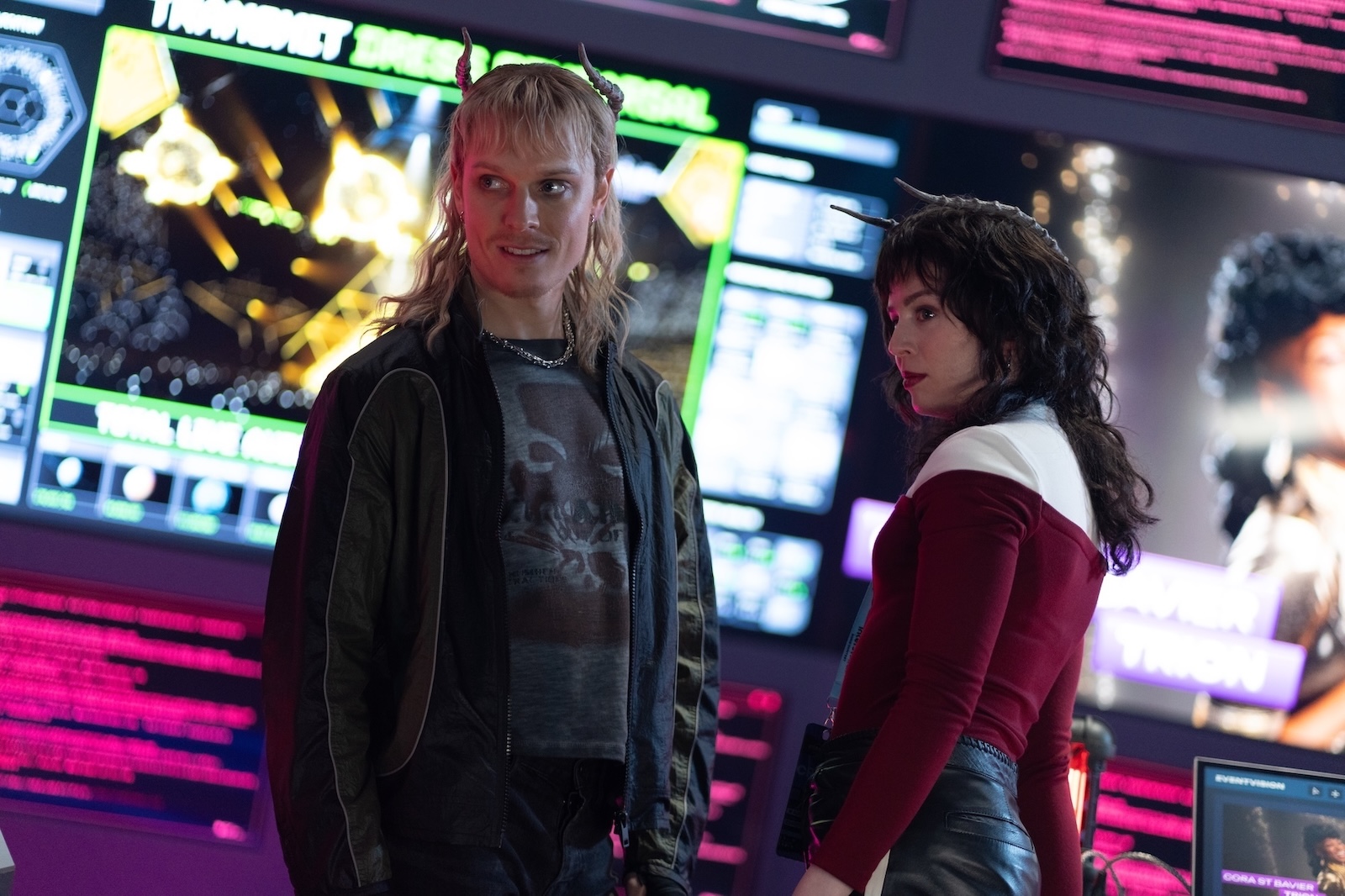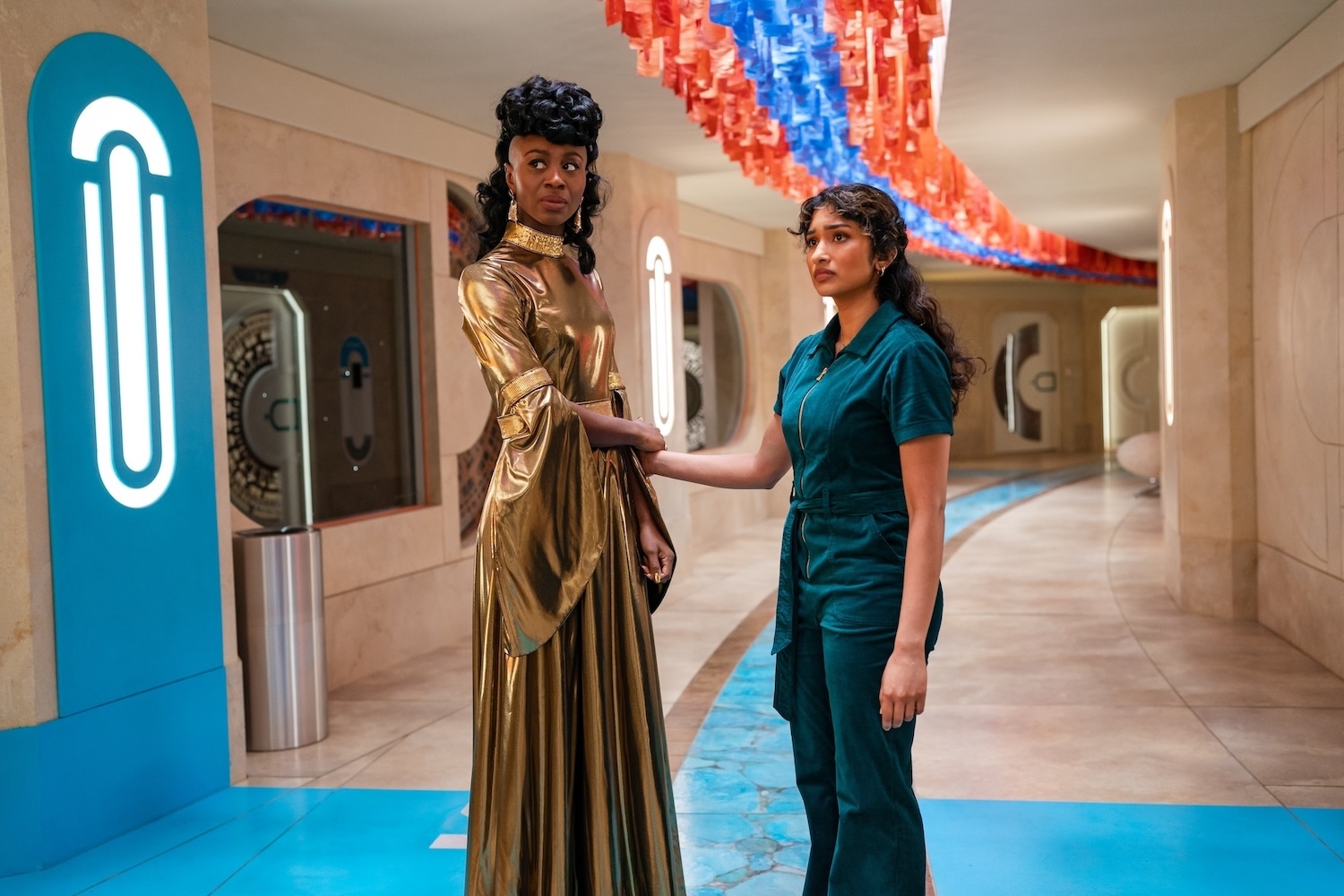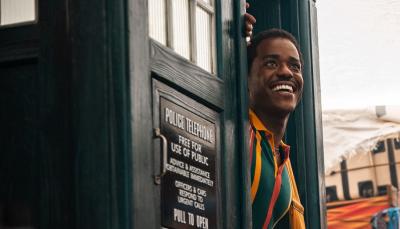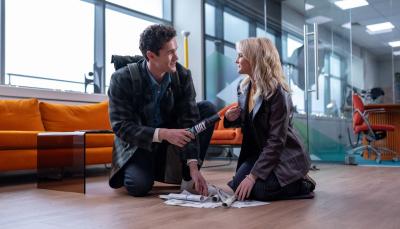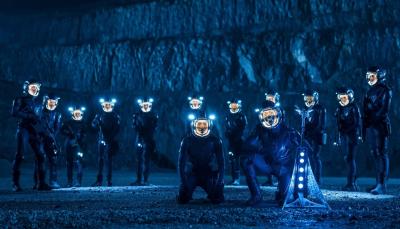'Doctor Who's "The Interstellar Song Contest" Earns Null Points for Singing
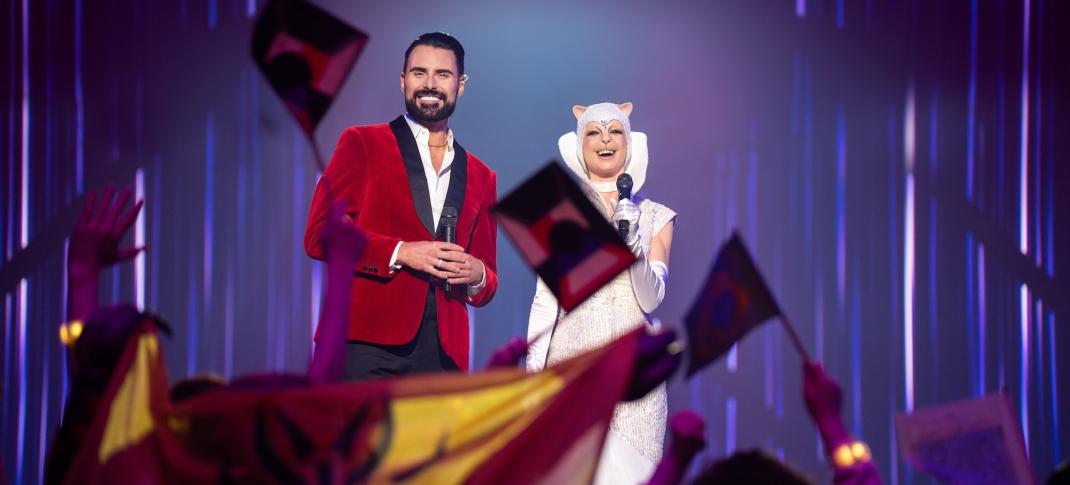
Rylan Clarke and Julie Dray in "Doctor Who"
(Photo: James Pardon/BBC Studios/Disney/Bad Wolf)
On paper, Doctor Who meets Eurovision feels like an unbeatable premise. An over-the-top, purposefully high-camp event, with flashy outfits that may or may not light up, coordinated dance numbers, and dedicated fanbases waging voting campaigns should result in an hour that's fun, if nothing else, and it seems a natural choice of setting for Ncuti Gatwa's charismatic, joyful Doctor. More importantly, whatever happens in the forthcoming two-part season finale is so brutal that Russell T. Davies successfully pushed for a release schedule change to ensure we're all forced to watch the end of it together. A musical number-focused romp is precisely the moment of levity we need beforehand.
Unfortunately, that's not the kind of episode this is at all. It turns out that "The Interstellar Song Contest" is actually a story that uses its high camp framework to attempt to dissect more themes than its narrative is equipped to handle. The result is a rare misfire in a season that has been otherwise full of bangers. The fun Eurovision-esque bits most of us likely tuned in expecting are restricted mainly to the episode's opening moments; there are half a dozen random supporting characters we barely get the chance to know, and a central plot that tries to wrestle with questions of oppression, vengeance, exploitation, and colonization.
The problem is that it doesn't really handle any of those questions well, and its central plot is clunkily resolved (both technically and thematically). That's not even touching on the whole "the Doctor is suddenly seeing mysterious visions of his granddaughter Susan (Carole Anne Ford)" thing, a moment that's literally been decades in the making, and will probably be the only thing anyone actually remembers about this episode. (Well, that and the post-credits scene that finally offers some answers about Mrs. Flood.)
Things start brightly enough: Fifteen and Belinda land during the introduction to the Song Contest, which is heavily implied to be a sort of intergalactic evolution of the Eurovision competition that most viewers will probably also watch directly after the episode airs. (Rylan — the U.K.'s answer to Ryan Seacrest — is even still hosting, thanks to a sort of cryotechnology that keeps him frozen whenever the competition isn't in session.) Ostensibly, the Doctor is there for another pit stop on the triangulation tour of the Vindicator, but once he and Belinda realize precisely what they've stumbled into, they're thrilled about sticking around. Unfortunately, things turn dark before we get through the first contestant's performance.
(It's an amazing-sounding track called "I Love You, But My Heart Says No", sung by Liz Lizardine from the planet Lizoko. Just think of the fun we could have had!!)
The control room backstage is suddenly taken over at gunpoint (droidpoint?) by a vaguely Joe Exotic-looking alien with horns named Kid (Freddie Fox), who has broken in with the help of his girlfriend Wynn (Iona Anderson), an employee of the Song Contest's production team.
Both are Hellions, an alien species frequently marginalized and derided throughout the galaxy. They've orchestrated a complex plot that involves breaking the gravity shield that allows the Harmony Arena to function, jettisoning the spectators into the vacuum of space, and then using the Song Contest's broadcast to send a delta wave targeted to kill at the approximately three trillion life forms watching along at home. Nightmare fuel doesn't begin to cover it.
Horrifying images ensue, as a hundred thousand spectators are sucked into of space, including Rylan, most of the contesants, the Doctor, and even the TARDIS. The collapse of the Harmony Arena's gravity shield is strangely beautiful, even as it encompasses one of the most dramatic acts of violence we've probably ever seen depicted on this show. Doctor Who, being Doctor Who, naturally has a backup technological explanation for why all those people aren't really dead (a sonic screwdriver-boosted "mavity field" keeping everyone in something like cryostasis that means they can be revived as long as Fifteen doesn't take too long about it). But for a few moments, you are genuinely meant to think they are, and it's all so upsetting that the Doctor's incandescent rage later in this episode certainly makes emotional sense.
Fifteen is prodded back into consciousness by repeated images of his granddaughter Susan, now much older than the last time he saw her, urging him to "go back," but otherwise being all sorts of vague and ephemeral. Is it really Susan? Is the Doctor hallucinating? Where is she? Why does freezing in space trigger this vision? Is she talking about the arena or Earth in 2025? These are topics we'll pretty much debate nonstop for the next week, but in all honesty, the answer could go either way to any of these questions.
The Doctor isn't the only survivor, however. In the area, Wynn managed to push a button in time to make sure that contestant Cora (Miriam-Teak Lee) from a planet called Trion is protected under one of the VIP domes. Her belligerent partner in crime doesn't notice, and Wynn doesn't seem terribly motivated to try and save anyone else, so it's evident the two have some unspoken history.
With the Doctor and Belinda separated, each joins forces with a convenient supporting character of the week. Fifteen is helped back into the station by Mike (Kadiff Kirwan) and Gary (Charlie Condou), a couple who not only turn out to have precisely the skills the Doctor needs to save the day — one is a nurse, the other a triangulation expert who worked on the Song Contest's tech design — but whose rocky relationship is put right again thanks to their near-death experience. Fifteen is truly a miracle worker. Elsewhere, Belinda befriends Cora, who is rapidly forthcoming with the information that she herself is secretly a Hellion, and knows the pair who've taken over the arena.
Kid, it turns out, is a revolutionary determined to get revenge against the Corporation that sponsors the Song Contest, which is responsible for atrocities that have taken place against his home planet. The Corporation, it turns out, bought Hellia and its people wholesale, solely to acquire their native Hell Poppy, which provides the honey flavoring in their most popular product. They took the seeds and burned the fields, leaving the local populations to starve and suffer in their wake. Kid himself lost his mother to the violence that followed, and is determined to tell the galaxy about the atrocities that have been committed against his people, presumably by killing trillions of them in an act of nearly unfathomable mass murder.
What's particularly unfortunate about this story is how over-the-top it is. There's plenty of sympathy and righteous anger to be mined in a tale of relentless capitalistic greed and the destroyed lives it can often leave in its wake. But Kid's mission — to kill trillions — in the name of his idea of justice and "awareness" is so outlandish, so intrinsically horrifying, that it's impossible to view the character as anything more than a one-note villain.
(Even Fox, a longtime pro at playing delightfully awful baddies, can't do much here.)
Kid's attempted act is so heinous that it provokes an almost equally horrifying reaction from the Doctor, who threatens and then almost gleefully tortures him, in a wild, vengeful fury we haven't seen from this incarnation before. It's his speech to Conrad on steroids, with some fairly sickening physical violence on top, and it's more than a bit challenging to watch. The idea that he was triggered by an event that veered too close to the destruction of Gallifrey and the Time Lords is interesting, but it sort of begs the question of why the attempted murder of three trillion people wasn't enough on its own.
This action from this particular Doctor, ostensibly born of the timey-wimey self-actualization process that allows (or will allow?) the Fourteenth incarnation to confront and hopefully process some of that trauma, just...it sits weirdly*. Gatwa sells the heck out of it, particularly the "ice in my heart" line, but it's an awkward fit with everything we've thus far seen him to be.
(*From Eccleston's Doctor? This absolutely makes sense. From Gatwa's? Not quite as much.)
But, truthfully, none of this will matter much thanks to this hour's big, franchise-shaking reveals. Crammed as it is with other themes and characters, "The Interstellar Song Hour" is a strange choice for a story in which to bring back not only the mystery of the Doctor's long-lost granddaughter but also to introduce the long-awaited return of a Classic Who villain fans have been clamoring for for years. But...here we are!
Many of us probably jokingly predicted Mrs. Flood was actually the renegade Time Lord known as the Rani in disguise back in Season 1....well, surprise, it turns out we were right. Forced to bi-regenerate in the wake of getting frozen in space, Mrs. Flood splits in two, with Archie Punjabi (The Good Wife) emerging as "the Rani" with Anita Dobson reduced to a more sidekick-esque version of the character ("a Rani"), and drops another massive plot twist in our laps, just in time for the two-part season finale. Here's hoping that its story can live up to all this history.
New episodes of Doctor Who stream on Saturdays on Disney+ in the U.S. and BBC iPlayer in the U.K.

